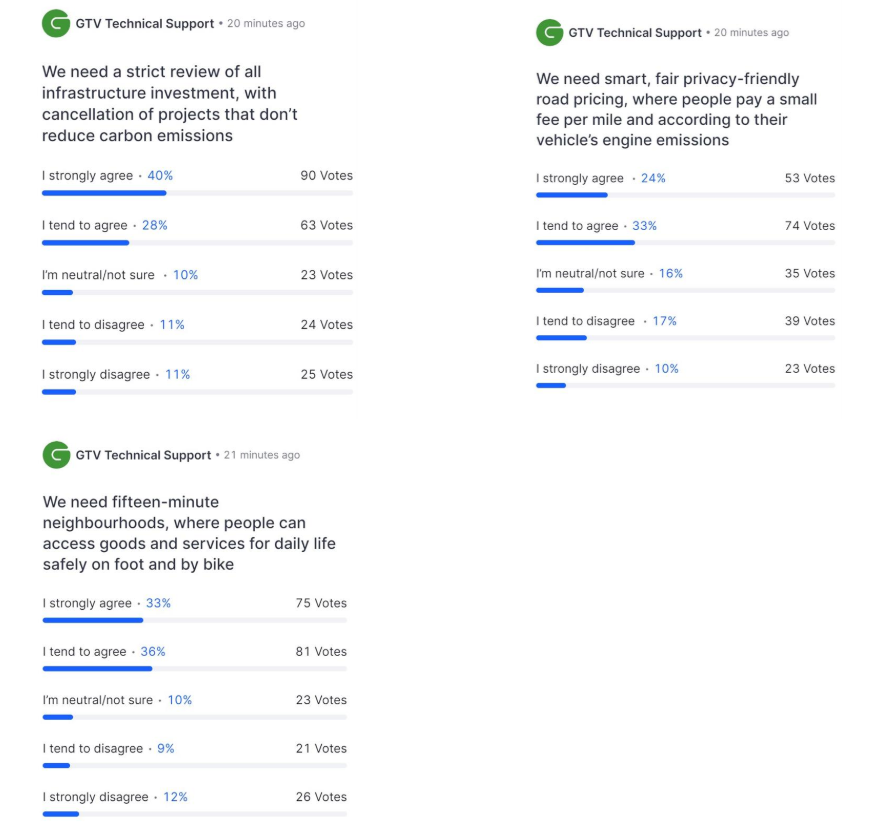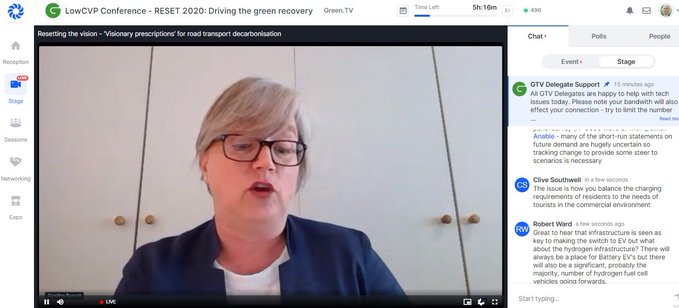My speech to the Low Carbon Vehicle Partnership annual conference
On Wednesday 15th July, I gave a speech to the online Low Carbon Vehicle Partnership Annual Conference 2020 – RESET: 2020 Driving the Green Economy. The Low Carbon Vehicle Partnership is a public-private partnership that aims to accelerate a sustainable shift to lower carbon, cleaner vehicles and fuels and create opportunities for UK businesses.
I was asked to put forward ‘Visionary Prescriptions for Road Transport Decarbonisation’, so I took the opportunity to call for 15-minute neighbourhoods, emissions-based road charging and greener infrastructure, which delegates then vote on. Here is a screenshot of the questions and the results of the polling, with the full text of my speech below:

We have been living through a massive and ongoing public health crisis since earlier this year, which has kept us all at home for months, stopped us meeting in person today and drastically changed all our every day activities with the need to keep physically apart to protect our health. This period has catapulted us further into a future, where there is more homeworking, more videoconferencing – but also some things we didn’t expect like more home schooling and a crisis in the distribution of flour.
The Climate Emergency. It’s not even waiting down the road, it’s at the door. We have to tackle it right now. We need a government agenda that puts removing the emissions of carbon at the heart of everything we do. Not just announcing pockets of money: a green announcement one day and a bunch of new roads the next. Decarbonisation is an opportunity to address injustice. In the last few months we’ve seen powerful protests across the world by Black Lives Matter prompted by the terrible death of George Floyd, and the inequality exposed by coronavirus. Inequality in society has affected many in this crisis – BAME communities, disabled people and those shielded or in care homes. We must think inclusively, justly and fairly as we decarbonise and rebuild our economy after the massive shock of coronavirus. Climate campaigners have said for years that business as usual is not an option as we fight climate change, now coronavirus has forced our hand. Cities will have to change.
Fares income has collapsed since lockdown. Public transport operators, including Transport for London despite having sizeable reserves, have needed government support. The ongoing need for physical distancing with reduced capacity on public transport and lift capacity limiting access to buildings means the whole model of daily flows of workers into city centres is broken. It also means massively reduced footfall for city centre businesses – I cycled through the City of London last week, it was extraordinarily quiet and most of the sandwich shops, dentists, barbers and hairdressers that depend on the daily influx of office workers were still closed.
We have adapted. Although home schooling isn’t that easy when you’re on a call with your office. And working a job from the same room you sleep in isn’t what any of us had planned. We have found ways through and by travelling less many of us are living more local, slightly less frantic lives. The months of lockdown left us with cleaner air and quieter skies – you could wake up to birdsong even in the heart of a city. Maybe we can keep some of that?
Of course the streets haven’t been empty. Small businesses have adapted and kept trading, serving their local communities – queueing safely, two metres apart – throughout the crisis. And home delivery services have been flourishing. Both conventional vans, and cycle couriers. And in the quietest days of lockdown the streets were filled with people of all ages from babies to grandparents on bikes.
Interestingly, the government has shown it is possible to react quickly on local transport. They took money already allocated to walking and cycling, suggesting it be used for temporary measures. Many councils have taken this opportunity to create:
- low traffic neighbourhoods to prevent traffic cutting through,
- school streets removing traffic outside schools when they open and close
- pop-up bike lanes on main roads providing missing links in cycle networks, and
- space for physical distancing on high streets – this started with space for queueing outside shops and is now turning into space outside for seating for cafes and bars.
If done well the Streetspace measures in London will support 15-minute neighbourhoods, my main policy proposal. That’s places you can live where all you need for daily life is accessible within a 15-minute walk of your home. And with less traffic dominated streets there’s more space for things like planters and parklets in parking bays – a real boost to biodiversity where people don’t have a garden to unwind. The way we use cities is going to fundamentally change. Rather than seeing flows of people into the centre of London every day, we’re going to see much more life and activity in the more dormitory-like villages pepper-potted through London – places where until recently many people only expected to live and not to work.
For 15-minute neighbourhoods to work well, our streets need to be less traffic dominated and more inclusive. It should be easy to get around in a wheelchair or to reach the park on a mobility scooter. And enabling everyone to be more active should be a public health priority. This means rethinking car use. A move away from car ownership, and towards access to a car only for the journeys it is really needed for. And as we decarbonise we shouldn’t assume that every existing internal combustion engine car will be replaced with an EV. Many should be replaced by ebikes along with access to shared car use and public transport.
With public transport capacity reduced for the foreseeable future to a fraction of normal capacity, it’s vital our streets work for walking and cycling to avoid a car led recovery, bringing worsened congestion, air pollution and road danger to our city. Which brings me to another key policy to making future transport resilient, low carbon and liveable, which is smart, fair, privacy-friendly road pricing – where people pay a fee related to their distance travelled and emissions produced. It is high time that we move to this modern and sophisticated approach to traffic reduction across London. Business, think-tanks, councils all know this needs to happen.
And, as TfL repairs its finances and builds a new budget it’s important that we review every planned investment. Which brings me to my third linked policy. We should conduct a strict review of all infrastructure investment, with cancellation of any projects that don’t reduce carbon emissions – like the Lower Thames Crossing and Silvertown Tunnel. The problem for emissions is mainly what is on the roads, not how many roads there are. We should be speeding up measures to reduce traffic, change remaining vehicles and to provide routes that enable walking and cycling.
So I want to close by bringing some threads back together. This has been a hugely disruptive period, but we can’t go back to where we were in January. We are going to see change to society and to our own lives on a scale many of us haven’t seen before. And that change must improve the quality of everyone’s lives, safeguard the environment and keep us all safer in a challenging world. We’ve sampled some change, lets grasp it properly and make the changes work for us, and the planet.

